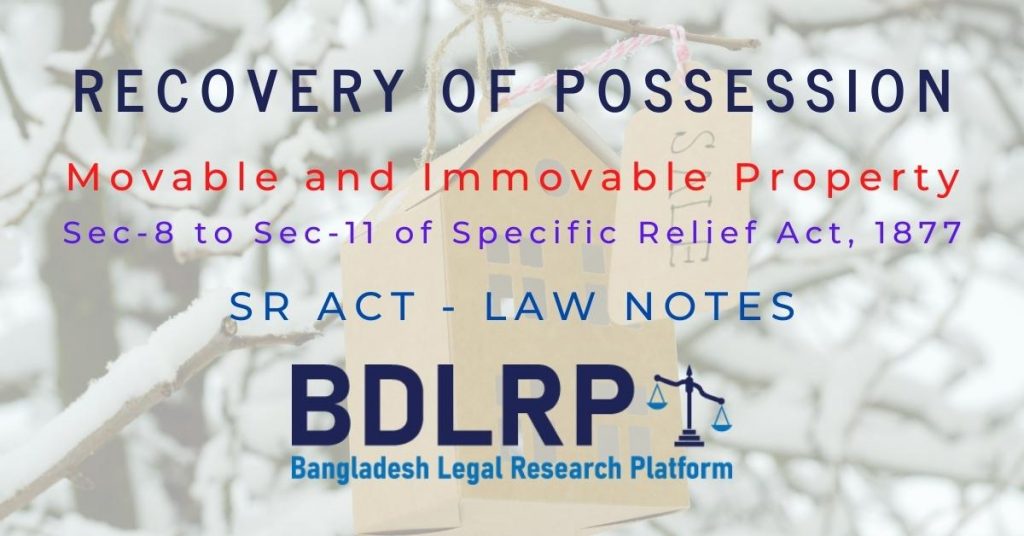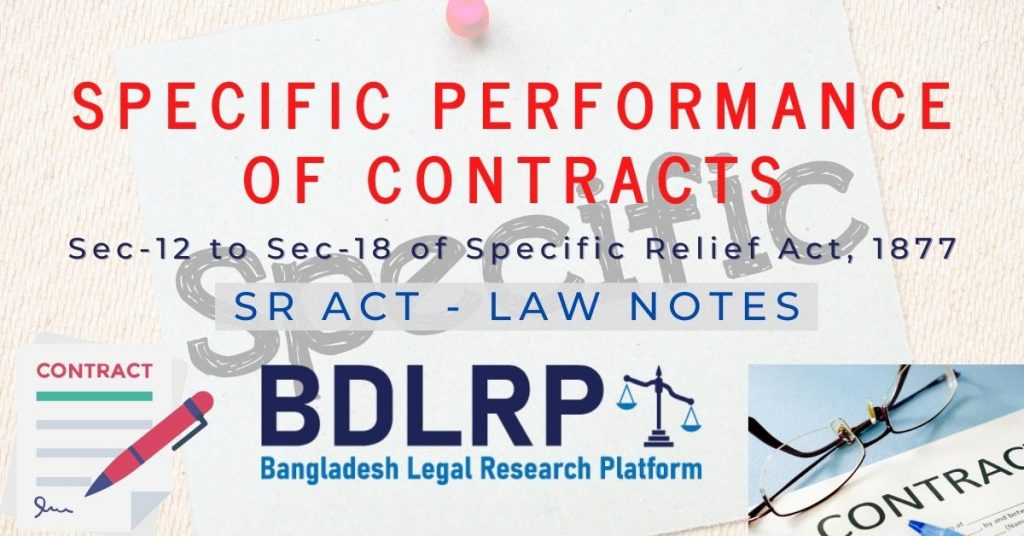Specific Relief Act, 1877
(a) Possession of Immovable Property
Sec-8: Recovery Possession of immovable Property:
A person entitled to the possession of specific immoveable property may recover it in the manner prescribed by the Code of Civil Procedure.
In order to file a case under section 8, the plaintiff must do the following:-
1- The first thing to prove or look at is ownership.
2- Filing of suits within 12 years.
3- The suit has to be filed by paying the proportionate court fee.
4- A lawsuit can be filed against anyone, including the government.
5- The court can order the destroy of the structure.
6- An aggrieved person can appeal or review.
7- Court can enforce decrees by issuing decrees.
Possession and Title Case Reference of Sec-8:
Possession is prima facie evidence of The general presumption of law is that possession goes with As far back as in 1663 in Smith v. Ovenden, Clarendon, L.C. He that hath possession hath right against all but him that hath right.”
In Shama Soondaree Devia v. Collector of Maldah. was held that- “If the plaintiff can prove that she was in possession of the property in dispute until she was ousted by the defendant against her consent, and without the intervention of a Court of Law, the defendant ought to be called upon to prove his title. If the defendant succeeds in proving his title, the plaintiff ought then to be required to prove a better one. That evidence of possession, however short, is evidence of title, is an undisputed proposition of law, and it therefore follows that such evidence is at least sufficient to make out a prima facie case in favour of the party by whom it is given.”
In Prem Raj v. Narayan Shiveam, Bombay High Court held, “possession is a good title against all person except the rightful owner, and entitles the possessor to maintain ejectment against any other person than such owner who dispossessed him.”
In Hamantrav v. Secy of State, Sir Lawrence Jenkins followed the above two decisions.
Sec-9: Suit by person dispossessed of immovable property:
If any person is dispossessed without his consent of immoveable property otherwise than in due course of law, he or any person claiming through him may, by suit recover possession thereof, notwithstanding any other title that may be set up in such suit.
- Nothing in this section shall bar any person from suing to establish his title to such property and to recover possession thereof.
- No suit under this section shall be brought against the Government.
- No appeal shall lie from any order or decree passed in any suit instituted under this section, nor shall any review of any such order or decree be allowed.
Recovery of possession by person illegally dispossessed: According to Section 3 of the first schedule of the Limitation Act, the lawsuit must be filed within 6 month.
- The plaintiff must be in continuous possession for at least two months Prior disposes.
- The court fee shall be half of the proportionate court fee.
- A Suit cannot be filed against the government.
- An aggrieved person can’t review the appeal.
- The court cannot order the destroy of the structure.
- Court can enforce decrees by issuing decrees.
Case Reference of Sec-9:
Karamat Ali v. Safi Ruddin Sk. 21 DLR 929 A landed is not deprived of possession by settling the land with ants but the mode of possession is altered only, and so, in case of possession of the tenant, a landlord can sue under s.9.
Decision of a bargadar is the dispossession of the landlord, and suit is maintainable by the landlord. If a tenant being dispossessed does not sue against the trespasser, the landlord cannot shut off from bringing such a suit.” The landlord is entitled to get possession from the trespasser where the tenant does not want such possession back. If a tenant with a view to get back possession the landlord as a co-plaintiff or files a separate suit, he would be entitled to actual possession except in the case of termination of before the decree, and the decree in favour of the landlord may be that of formal possession. But where the tenant has notion to get back such possession the landlord is entitled to actual A person is entitled to recover possession where he passed the property under the landlord on an invalid lease.”
After amination of the tenancy if the ex-tenant is dispossessed thought his consent and in an unlawful manner while he was holding he is entitled to the benefit of s.9. Where a person has been in el occupation of a land without any payment of rent to the lawful e since long, he cannot be allowed to take shelter in legal ethicalities to defeat the spirit and objective of this section is that a person is expected to come with clean hands to get equable reliefs from the court. A third person dispossessing a indoor between one tenant’s quitting and another tenant’s coming is liable to be evicted under s.9.” Jurisdiction of the High Court Division to revise an order under sec-9 is not barred.” The High Court Division exercising power under s.115, CPC has got no scope to convert a suit under section 9.
Distinction between Section 8 and Section 9:
Section 8 and Section 9 of the Specific Relief Act, 1877 deals with possession of immovable property. The two sections give alternative remedies and they are mutually exclusive. Distinction between Section 8 and Section 9 are given below:
1. Section 8 of the Specific Relief Act, 1877; This section mentions that recovery of Specific immovable property which is prescribed in the C.P.C.
2. The section said ‘A person entitled to the possession of Specific immovable property may recover the manner prescribed by the Code of Civil Procedure.
3. In possession it does not necessarily involve physical contact. The limitation of filing a suit under Section 8 is 12 years. If any person wants to file a suit for recovery of possession of any property in which he has ownership, he has to file a suit under order XXI, rule 35 of C.P.C. and
4. Section 8 of the Specific Relief Act. Section 8 shall be brought any suit against the Government.
5. In section 8 the court order to destroy of the structure while section 9 the court cannot order to the destroy of the structure.
(b) Possession of Movable Property
Sec-10: Recovery of specific movable Property:
A person entitled to the possession of specific moveable property may recover the same in the manner prescribed by the Code of Civil Procedure.
- Explanation 1 – A trustee may sue under this section for the possession of property to the beneficial interest in which the person for whom he is trustee is entitled.
- Explanation 2 – A special or temporary right to the present possession of property is sufficient to support a suit under this section.
There are four persons can file a lawsuit under this section. They are:
(i) Owner of the property.
(ii) Trustee.
(iii) Pawner.
(iv) Any person who find lost goods.
illustration:
A receives a letter addressed to him by B. B gets back the letter without A’s consent. A has such a property therein as entitles him to recover it from B.
Case Reference of Sec-10:
Specific moveable property. The form of specific relief provided by sec-10 is applicable only where the goods themselves are recoverable. And the mode in which defendant’s possession was acquired is disregarded; and the relief sought is limited to the delivery of goods and any special damages for their detention.
Sec-10. provides for the recovery of moveable property in specie, i.e., the very property itself, not its substitute or equivalent. The goods must be ascertained and capable of identification, and the nature of things must not be altered. If the goods ceased to be recoverable, and the relief is sought either for their wrongful taking and consequent loss, or for the misappropriation of the goods, then it is a pure question of trespass or conversion, and the relief is by damages’.
Jaldu Venkata Subaras v. A.S.N. Co Ltd, ILR 39 Mad. 381. So, this section cannot be resorted to the recovery of money, unless the contract is for delivery of particular coins.”
Government securities are specific properties, they are not money. So also share certificates. The of Rameshwar v Mata and Ram Narain v. Umrao Singh‘ are not correct so far they hold a suit for money could be considered as a suit for “specific moveable property”.
So, also the decision of the Calcutta High Court in Tula Ram v. Mohri Lal Standing crops are not moveable property. Tiled huts,” trees” and fixtures” are not moveable property.
Sec-11: Liability of person in possession, not as owner to deliver to person entitled to immediate possession:
Any person having the possession or control of a particular article of moveable property, of which he is not the owner, may be compelled specifically to deliver it to the person entitled to its immediate possession, in any of the following cases:-
- when the thing claimed is held by the defendant as the agent or trustee of the claimant;
- when compensation in money would not afford the claimant adequate relief for the loss of the thing claimed;
- when it would be extremely difficult to ascertain the actual damage caused by its loss;
- when the possession of the thing claimed has been wrongfully transferred from the claimant.
Clarification:
Delivery of the specific immoveable property to the plaintiff from the possession of any person other than the owner, in which cases the plaintiff is entitled to immediate possession.
There are four remedy under this section may be granted:-
1- where the defendant holds the movable property as trustee or agent.
2- where monetary compensation is inadequate.
3- where actual lost is difficult to determine.
4- where the defendant unlawfully possessed the movable property of the defendant.
Illustration:
A is entitled to a picture by a dead painter and a pair of rare China vases. B has possession of them. The articles are of too special a character to bear an ascertainable market value. B may be compelled to deliver them to A.
Case Reference of Sec-11:
Kartik Charan v. Gopal Kristo, ILR 3 cal. 264
Lalchand v. Harichand, 43 CWN 903
Prepared By-
- Faisal Ahmed
- A.K.M Fahim Chowdhury
- Kazi Mohinul Islam



Comments are closed.